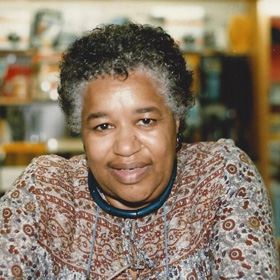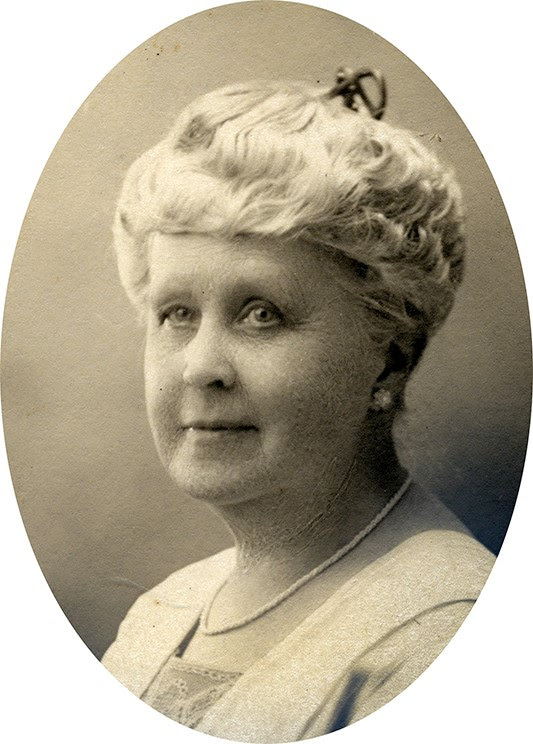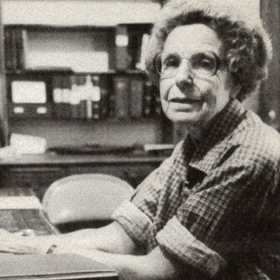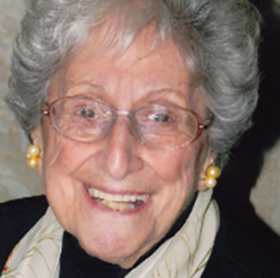Feelings of “saudade,” love, loss and longing, were created when Maria Fernandes Alves (1924-2008) sang fado, traditional Portuguese folk music, throughout the South Coast and beyond. Recognized by the U.S. Senate as the first American-born fadista, Maria was one of the inspirations for entertainment at the Museum of Madeiran Heritage’s Museum Café during New Bedford’s annual Feast of the Blessed Sacrament.
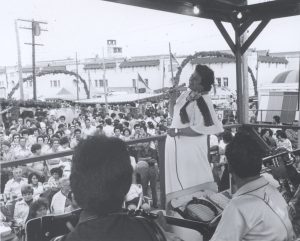
Citation: “[Feast of the Blessed Sacrament],” 1976, Photograph, Maria Alves Collection
Born in Cambridge, MA to Maria (Duarte) and Frank Fernandes, emigrants from northern Portugal, Maria was one of nine children. The Fernandes family moved to Acushnet, where Maria began to sing at the age of 13. By the age of 15, Maria and her family settled in western Massachusetts, and she would remain in South Hadley for over 60 years. Maria married John Alves of Madeiran ancestry, who had been raised in New Bedford. They had two sons, John and Frank.
As Maria continued to sing fado throughout the Northeast, she returned to New Bedford each year to perform at the Feast of the Blessed Sacrament. Museum of Madeiran Heritage Committee Chairman Joseph Sousa describes Maria’s impact on the Feast, “A beloved fadista, Maria was one of the inspirations for entertainment in the Museum Café, making it a venue for fado singers at the Feast.” The Museum Café remains the Feast’s intimate setting for fado, where listeners experience “saudade,” the deep longing for someone or somewhere. A plaque on the side of the Museum, facing the Museum Café in the courtyard, honors Maria with her image and lyrics from one of her songs.
Maria sang the traditional songs of the Lisbon fado houses, often translating them into English for American listeners. From Toronto to New Jersey, she would sing at Portuguese club fundraisers, restaurants and festivals, performing three weekends each month. On the South Coast, Maria had devoted followers at many restaurants. She also performed worldwide in Lisbon, Rio de Janeiro and in Canada. Maria performed in concerts, as well as on radio and television. She introduced fado to students at local schools and universities, including Durfee High School and the University of Massachusetts Dartmouth.
After Maria’s death, her friend Ana Vinagre, also a fado singer, explained, “She sang fado in a way that told you she loved Portugal, even though she was American. And she sang some songs in English. She didn’t want anyone to feel left out.” Maria’s son added, “She liked to think she was the link between the early immigrants and their culture that they had left behind. She did it through music.” Manual Leite, a Portuguese guitarist who often accompanied her, remembered, “She could sing so well it made my job easy.”
As Maria’s voice was heard, she received honors at state and federal levels. In 1964, the state of Connecticut honored her for her work within the growing Portuguese communities of Hartford, Waterbury, Danbury and Naugatuck. In 1996, the Day of Portugal Association of the state of Rhode Island recognized her for her work with Rhode Island’s Portuguese communities. In the fall of 2007, Maria was acknowledged by the mayor of Providence and the governor of Rhode Island for her many contributions to Portuguese culture. Six months before her death in 2007, the U.S. Senate recognized her as the first American fadista, acknowledging her many contributions through music to the Portuguese community in this country.
The tables have turned at the Museum Café of the Museum of Madeiran Heritage, where fadistas continue to create “saudade,” that deep longing for someone or somewhere. Each year, in the Museum Café at New Bedford’s Feast of the Blessed Sacrament, music becomes remembrance as family and friends now have “saudade” for Maria.
Maria passed on May 9, 2008, in Hartford and was buried in South Hadley.
Ann O’Leary
Information from
- “Maria (Fernandes) Alves.” Hartford Courant, 12 May 2008, https://www.legacy.com/obituaries/hartfordcourant/obituary.aspx?n=maria-alves-fernandes&pid=109534509.
- O’Connor, Kevin P. “Friends Mourn Maria Alves, First ‘American Fadista’.” SouthCoast Today, 13 May 2008, https://www.southcoasttoday.com/article/20080513/NEWS/805130346.
- Sousa, Joseph, John Alves, and Olga Jacques. Personal interview. Museum of Madeiran Heritage, 26 July 2019.
!["[Maria Alves]," 1970, Painting, Maria Alves Collection Color painting of Maria Alves -- a woman with short black hair wearing a light green-blue dress, black shawl, and jeweled brooch and earrings.](https://historicwomensouthcoast.org/wp-content/uploads/2019/08/Maria-Alves_cropped-418x418.jpg)

